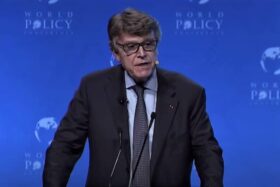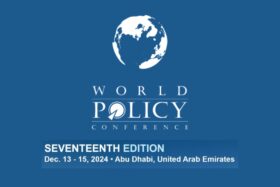Video in French then in Engllish (English starting at 10:00 min)
Opening speech of the 11th WPC, 26 October 2018, Rabat, Morocco
The further we move into the 21st century, the more its contradictions burst into view. First of all, many of the promises borne by today’s engulfing technological revolution are becoming reality. Some have called it the 4th Industrial Revolution; in fact, it is an unprecedented and historic transformation unlike anything ever experienced. Self-driving cars, three-dimensional traffic inside cities, “smart” homes and cities, robots everywhere, blockchain – the technology that will potentially transform transactions of all kinds by deleting the need for “trusted third parties”, the prospect of vertical and flourishing agriculture all the way into the desert, and the augmented or repaired human: these are just a few examples of the world of tomorrow, which many of us here will experience.
And yet the world of yesterday still strongly shapes our present. Some said technology would eventually erase borders and promote the rapid onset of a blissful globalisation. Instead, we are witnessing an exacerbation of nation-based realities, which irresistibly mirrors the past two centuries back to us. If I had to single out the dominant geopolitical phenomenon of the next thirty years, I would say without hesitation: the rivalry between China and the United States. Why thirty years? Because the current leadership of the Middle Empire has no hesitation, contrary to those that preceded it, about asserting loud and clear its aims when it comes to power – in the most traditional sense of the term – to celebrate the centennial of Mao Zedong’s victory in China in due fashion. As early as 2001, George W. Bush wanted to make this relationship the main focus of his foreign policy. 9/11 threw him off course. Today, Donald Trump has veered back to re-open the topic, focusing above all on its commercial aspects in the broadest sense. In any case, in my view, all the other geopolitical issues in the years to come will need to be considered of course for what they are individually, but always in relation to this immense new surge. This holds, firstly, for the construction of Europe, the failure of which would be a tragedy for the Member States, but also – I am convinced of this – for the rest of the world: nobody wants to be trapped in another bipolar world and a form of mega cold war. It also goes for the construction of a new order in the Middle East, for which there is a glaring need. Some are already announcing a full-out war between the United States and China, conceivably triggered by an incident like the Sarajevo assassination just over one century ago. Others, in my opinion more accurately, believe such a war would be unlikely as long as the global economic governance does not deteriorate massively, just as World War II could probably have been avoided had there not been the “Great Depression” of the 1930s. In any case, from a political and economic point of view, we all need to put our energies toward better assessing the ultimate consequences of policies that push Russia or Iran into the arms of the rising superpower, or that promote the extension of China’s influence in Europe, the Middle East, Africa and elsewhere.
How can we not also be concerned about the return, in international politics, to violence that is not only verbal, but palpably real, in the behaviour of a growing number of States? The first to come to everyone’s mind are States that do not claim to be democracies or are moving away from democratic principles. Yet who would have thought in the past that a US president would be constantly doling out insults and threats, as much to his real or supposed adversaries as to his allies? Who would have imagined that the economy’s levers would be misappropriated and turned into omnidirectional weapons for political purposes? I am referring in particular to the conditions for the imposition of new sanctions by the United States after its unilateral termination of the nuclear treaty with Iran (the JCPOA). Almost two years after Donald Trump’s election, I must admit his actions do have certain coherence to them, and that the systematic use of the “survival of the fittest” principles has yielded results. Some of these even usher in new hope, such as the rapprochement between the two Koreas, even though evidently, things are far from proceeding according to the US President’s plan. Kim Jong-un and Moon Jay-in have their own agenda to run. Korea has, over the centuries, learned how to behave toward the giants surrounding it. That being as it may, how can we overlook the fact that the short-term gains achieved by America in terms of trade or perhaps with respect to Iran will also inevitably trigger reactions that have immense long-term consequences? Thus, even if the institutions of multilateralism hold up against the barrage orchestrated by the 45th President of the United States, I believe that the dollar’s survival as the single global reserve currency is now being challenged in a very real manner. Seeing this, the middle powers, the importance of which is one of the WPC’s leitmotivs, should feel stirred to double up their efforts toward building global governance that is not dependent on the unpredictable march of the dominant power.
The conflict between the new and the old era is not limited to the contradiction between the globalisation implied by technology and the stronger affirmation of national reality. The tide of political Islamism, which has built steadily for four decades, continues to wreak havoc across Muslim lands and beyond. There is no evidence indicating that it has begun to recede. What’s more, the deviation of religions for use as political weapons is not limited to Islam alone. In the most recent news and admittedly on a very different scale, the separation in progress between the Russian and Ukrainian Orthodox churches illustrates the complexity of the tie between religion and politics, well into the 21st century, which André Malraux allegedly proclaimed would be religious or at least spiritual. In any case, one of the major objectives of global governance must be the fight against all forms of religious warfare, which time and time again have left entire populations in mourning, leaving only devastation – at least for a time – in their wake.
Government is not only guided by reason. Government is not only guided by emotions. There must be a balance; there must be some sense of measure. Instead, what we see before us is polarisation: the triumph of reason, as expressed by the technological revolution, is indirectly exacerbating the most destructive passions and the most malevolent misappropriations of the aspiration for the divine. More than ever, I believe in the value of the mission which the WPC has made its own these past 10 years. Ever greater attention must be paid to all the commons of humanity, starting with the climate and the environment. We need to identify these areas of common heritage and learn to manage them collectively. The practices through which democracy is brought to life need to be reinvented in order to better combine dignity and efficiency. By actively conveying this message, the WPC hopes to contribute, albeit modestly, to the sustainable development of a reasonably open world that allows human beings – whatever their beliefs – to better experience both the reality and the mystery of their existence.



